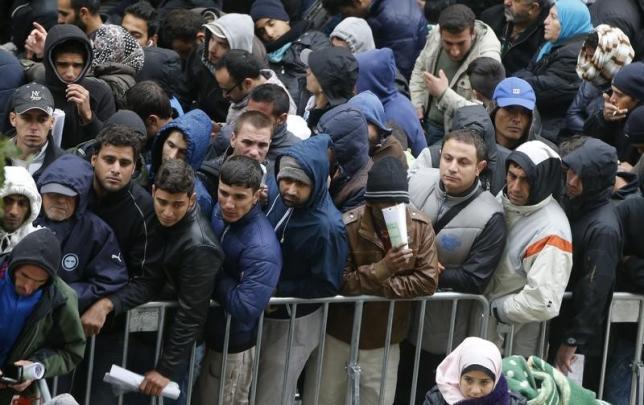EU talks tough on deportations amid flood of Syrian refugees
LUXEMBOURG: European Union governments are set to agree on Thursday to step up deportations of illegal immigrants among the hundreds of thousands who have failed to win asylum as they try to cope with a surge in refugees from war-torn Syria.
Diplomats say interior ministers meeting in Luxembourg should agree, among other things, to back the detention of those who may abscond before expulsion and exert more pressure on African and other poor states, including via aid budgets, to make them accept the return of citizens refused entry to Europe.
In the evening, they will be joined by EU foreign ministers and delegations from Balkan states, Turkey, Jordan and Lebanon for talks on stemming migrant flows that have plunged the bloc into crisis, dividing members over how to secure the EU external borders and how to share responsibility for housing refugees.
The meetings are part of efforts to implement a package of measures put forward by EU officials over the past six months and which have this week involved the start of negotiations with Turkey, temporary home to more than half of the four million Syrian refugees, to try and discourage people from travelling.
German Chancellor Angela Merkel, who angered some of her eastern neighbours over the summer by offering a welcome to more Syrian refugees, made clear in a speech on Wednesday that Europe would also do more to deter and expel the hundreds of thousands who reach Europe every year illegally in search of prosperity.
She told the European Parliament that while offering a safe haven to those fleeing war and persecution was a duty, the EU must also tighten its arrangements with poorer nations "so that those who have no prospect of staying (as refugees) are actually taken back to their home countries."
A draft of conclusions of Thursday's interior ministers' meeting, seen by Reuters, reads: "The EU and its member states must do more in terms of return. Increased return rates should act as a deterrent to irregular migration."
Refugee agencies say more deportations can free up space for those who are fleeing in genuine fear for their lives.
In recent years, fewer than 40 percent of people whose asylum claims are rejected have actually then left the EU.
IMPLEMENTATION TEST
Other elements of EU migration policy include increasing aid for refugees who stay in the Middle East and tightening procedures for identification on arrival in Italy and Greece.
Appearing with Merkel, French President Francois Hollande called for a permanent EU Coast Guard and Border Guard service.
On Wednesday, EU-run naval patrols off the Libyan coast formally adopted new rules of engagement intended to let them attack people-smuggling operations.
One of the most divisive issues for EU states has been new programs to relocate asylum seekers from the frontline states of Italy and Greece around the bloc. Ex-communist eastern states have been very vocal in rejecting large-scale immigration.
However, the first such relocation, of Eritreans heading to Sweden from Italy, is due to take place on Friday. That movement has been a key demand of Rome and Athens. They are in turn under pressure from northern countries like Germany and France to accept EU personnel to help control their borders.
As EU governments continue to add detail to their package of response plans, the coming months will provide a major test of how realistic they are. Italy has already warned that it is not willing to host what it calls "concentration camps". And the lack of border controls between EU states presents a major challenge to the plan to direct asylum-seekers to particular parts of the bloc.






